
8 minute read
Resilient business location in the far West
by medianet
The production sector is making a major contribution to the added value and employment in Vorarlberg
The production sector remained surprisingly stable during the Covid-19 pandemic and its lockdowns despite problems in the international supply chains and the resulting loss in revenue. The high flexibility and the adaptability of many companies and the good mix of industries in Vorarlberg managed to dampen the lower economic output. A study took a closer look at the workings of supply chains this summer: “Its recommendations for action aim to further strengthen the resilience and adaptability of Vorarlberg’s economy in order to counter future economic shocks effectively from a position of strength,” says Governor Markus Wallner, who presented the study with Regional Councillor for Economic Affairs Marco Tittler and Jimmy Heinzl, Managing Director of the Vorarlberg business agency Wisto (Wirtschafts-Standort Vorarlberg GmbH).
Advertisement
About the study
“Vorarlberg is one of the world’s top economic regions. The Covid-19 pandemic has led to losses not only internationally but also in the export-oriented economic area of Vorarlberg. The federal government reacted with a number of immediate relief measures for businesses and the Province of Vorarlberg added a complementary programme. The study ‘Resilient Added Value in the Face of Covid-19’ was part of this package,” Wallner explains the study’s background.
The results of the study are based on trend and network analyses, complemented by economic research and qualitative interviews with 20 companies from Vorarlberg’s production sector between October and December 2020, as well as an online survey of 107 companies in February 2021. The study was published by Pöchhacker Innovation Consulting, the Institute for Industrial Research IWI and Wisto.
Vorarlberg’s industrial characteristics
Governor Wallner considers the task of the public sector – in addition to immediate relief measures for secure liquidity – to create the right incentives: “Topics for the future such as innovation, digital know-how, circular economy, the availability of skilled staff and new work concepts need to be pushed so the production sector can remain a main driver for growth and wealth.”
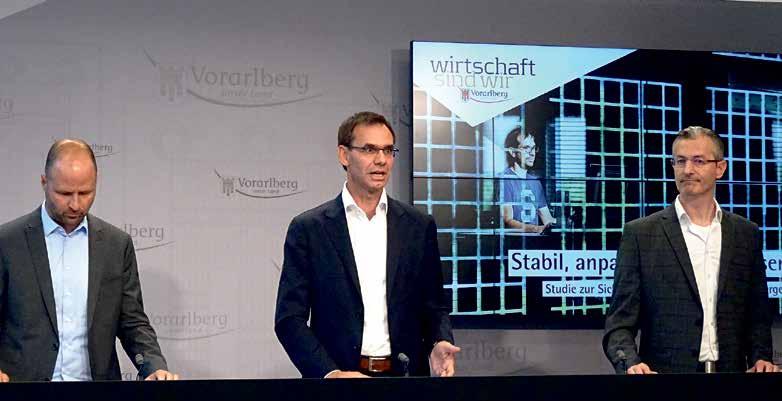
Working for Vorarlberg’s economy: Regional Councillor Marco Tittler, Governor Markus Wallner and Jimmy Heinzl, Managing Director of Wisto
Vorarlberg is shaped heavily by the industrial sector and the material goods production makes an above-average contribution, Regional Councillor for Economic Affairs Marco Tittler adds: “The production sector and its roughly 65,000 employees make up almost 40 percent of the regional added value, which is ten percentage points above the national average. This plays a major role in the creation of jobs and wealth. 28 percent thereof can be accounted purely for the production of goods.” Measured by size, Vorarlberg’s most important industries are metal production, food production, textiles production, machine construction and the production of rubber and plastics goods. These five industries have a high degree of specialisation and generate 65 percent of the industrial added value in Vorarlberg.
Jimmy Heinzl also considers the production sector’s strong performance highly significant: “Almost one in three employees in Vorarlberg is working in the production sector and material goods production generates high multiplying effects in terms of turnover, added value and jobs – in Vorarlberg and all over Austria. The high industrial density in Vorarlberg is thus making a significant contribution to the power of the regional and national economy. Preceding and subsequent economic areas along the value-added chain also benefit.”
When calculating economic multipliers, there are direct, indirect and induced effects. Direct effects are production, added value and jobs that companies generate directly through their ongoing operations. Indirect effects come from intermediate consumption, i.e. companies generate demand at suppliers, dealers and service providers, who in turn generate intermediate consumption at other companies. Induced effects are created by consumption made possible from direct and indirect employment, and by investment effects.
Impact of the Covid-19 pandemic – resilient Vorarlberg
Global trade took a massive hit and international supply chains were faced with far-reaching problems due to the Covid-19 pandemic and the ensuing lockdowns. Factory closures, production stops and impaired logistics chains led particularly at the beginning of the pandemic to supply shortages and missing raw materials. This was further impaired by a reduction in customer demand for consumer and investment goods. Those regions that are connected closest to the international added value chains were impacted particularly badly by the slump in international trade.
Due to above-average export and import ratios in Vorarlberg’s production sector and the geographic position right in between its most important foreign trade partners, domestic companies are integrated heavily into the regional, national and international added value chains. Despite the therefore higher dependence
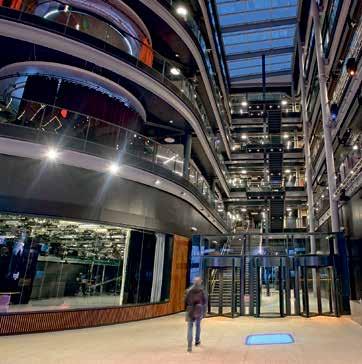
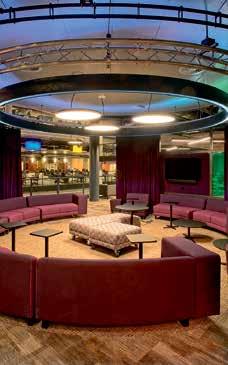
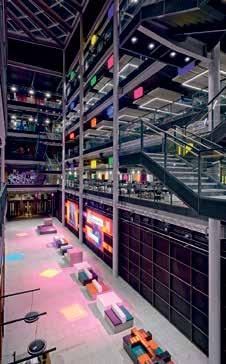
Zumtobel developed a lighting solution for the new headquarters of BBC Wales in Cardiff to create the ideal lighting conditions for journalistic work.
on imports in specific commodity groups, the economic region Vorarlberg was impacted less badly by the Covid pandemic than other Austrian provinces.
The surveys conducted for the study showed that many of the production companies from Vorarlberg overcame the pandemic relatively well: “The diversity of industries and the high degree of specialisation among the industrial companies are a major asset of Vorarlberg and a central factor for the resilience of the regional economy. The crisis has shown that diversified regional added value networks are more resilient against external shocks. Increasing this resilience and the adaptability helps secure jobs and thus increases the regional added value,” Tittler says.
Securing the business location
Due to the tremendous importance of the material goods production for Vorarlberg’s added value and job market, the province aims foremost to secure the production sector, to facilitate growth for this significant economic area and to ensure its resilience remains high. According to Heinzl, there are five fields of action:
Field of Action 1 focuses on securing the availability of scarce production factors. This includes not only the availability of raw materials, auxiliary materials and operating materials but also industrial real estate for expansion projects. Field of Action 2 targets the expansion and safeguarding of resilient added value chains. In order to minimise the negative impacts and dependencies in case of global shocks, a package of measures is recommended. Relocation of important economic fields into the European common market, securing key businesses on location, pushing regional companies for public tenders and internationalising and diversifying the customer base are issues that need to be tackled.
Field of Action 3 focuses on modernising economic structures as processes of structural adaption are decisive for the long-term success of a business location. This includes promoting innovation dynamics, supporting the digital transformation of the economy, pushing the establishment of digital and high-tech startups as well as the strategic-selective settlement of businesses.
A major factor for a well-oiled business location are the right framework conditions for employment. Field of Action 4 targets improvements in this area such as creating the right infrastructure, legal guidelines, the availability of production factors in general and public business promotions. Deregulating and accelerating administrative processes, accelerating the digital administration, step-by-step expansion of freight transport infrastructure and setting up high-performance broadband networks are the most important issues here.
Field of Action 5 focuses on creating more awareness for regionality and regional added value. The strategic significance of the production sector for Vorarlberg needs to be highlighted and communicated better to increase the awareness among people for regional added value. ◆
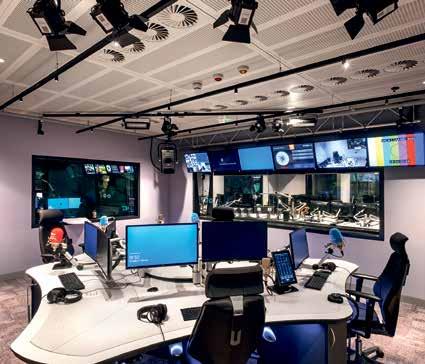
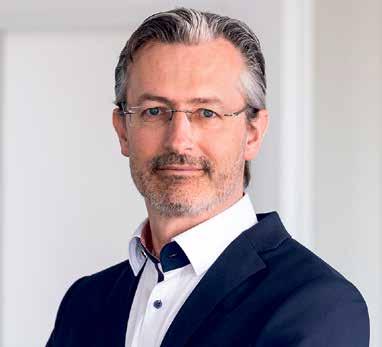
© Studio Wälder
Jimmy Heinzl, Managing Director of the Vorarlberg business agency Wisto
Overview of the study’s findings
c Integrating Vorarlberg’s production sector into international added value networks is an essential factor of success for the domestic economy and a driver of the regional economy. c The region’s politico-economic focus should be on securing the existing added value fields and supporting the further growth of existing businesses. Selective business settlements to close gaps in the added value, to modernise the economic structures and to improve the access to (digital) technologies are effective complementary measures. c Economic stimulus plans for the production sector need to target future-proof investments and measures. Topics such as innovation, digitisation, digital know-how as well as new work concepts and models have a high significance here. c Vorarlberg has a good mix of industries and a regional added value chain on a high level. The crisis has shown that diversified regional added value networks are more resilient against shocks. The diversified economic structure needs to be preserved. c The impact of the Covid-19 pandemic on the production sector transpired foremost through a slump in customer demand (i.e. order deferrals and cancellations), though some economic fields actually saw increases in turnover (e.g. the food industry). c Research for the study gave the impression that the production sector already had a very professional supply chain management prior to the Covid pandemic. Existing strategies had been accentuated and developed further by the experiences made during the pandemic. The various ways to secure supply chains are now much more diverse (e.g. stockkeeping of critical components and broadening the supplies base). c Therefore, safeguarding the resilience of added value chains is also considered a core task of companies themselves. c Providing the necessary production factors in sufficient quantity and quality is an effective way to secure added value in the production sector on location. This concerns foremost the availability of (technologically) skilled staff and commercial real estate for expansion projects of domestic companies (in the production sector). c The framework conditions of employment need to be finetuned in the best way possible for the international competitiveness of Vorarlberg’s production sector. This concerns the right infrastructure on the one hand (e.g. connections to cross-regional transport networks and comprehensive broadband networks), and efficient, automated and mostly digitised administrative channels on the other hand. The entire study “Resilient Added Value in the Face of Covid-19” is available at: www.wisto.at/studien/wertschoepfungsketten










